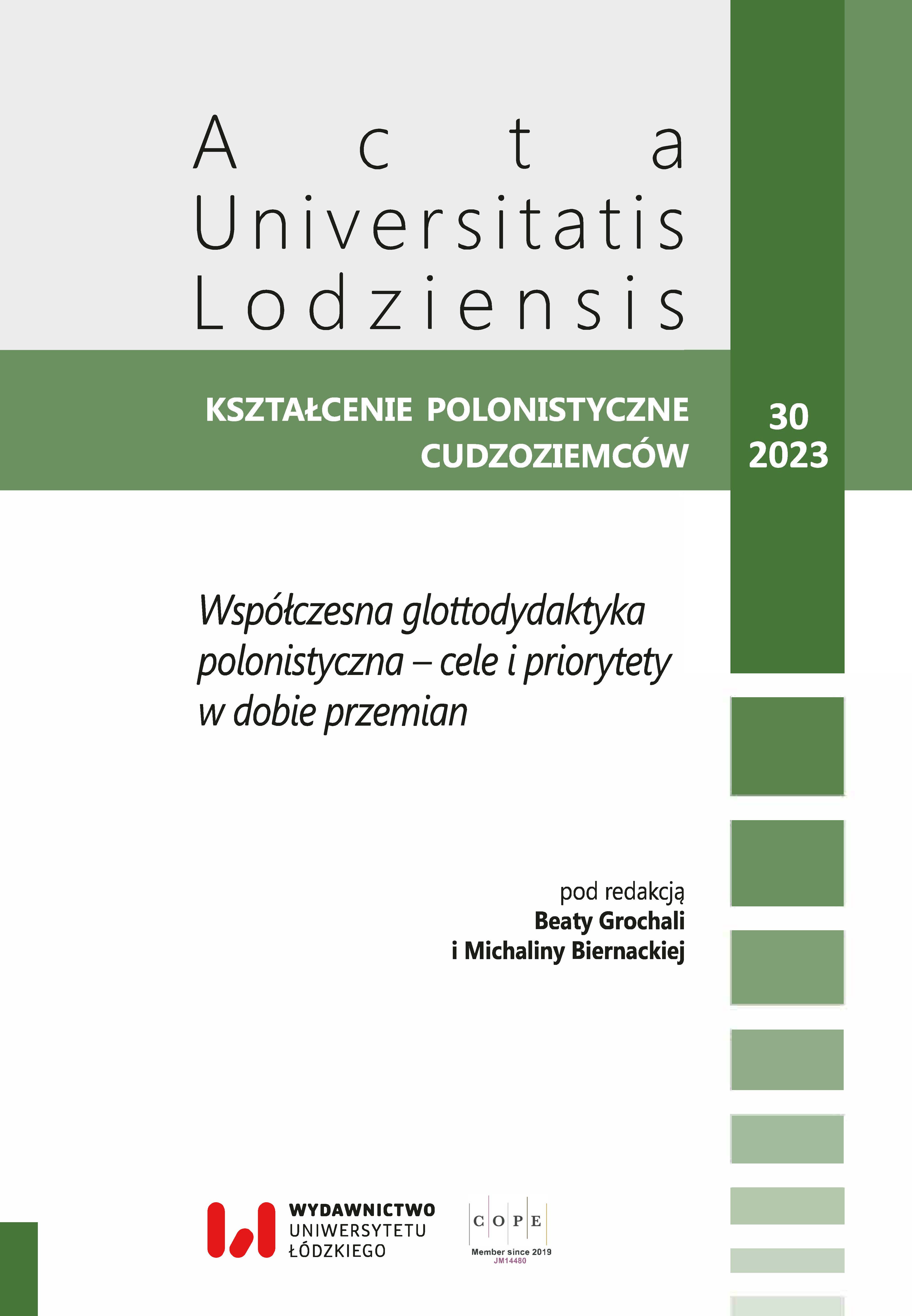You can’t be happy without grammar – on the conditions necessary to achieve a state of flow in the context of Polish glottodidactics
DOI:
https://doi.org/10.18778/0860-6587.30.09Keywords:
grammar competence, flow, state of flow, educational project, action-oriented approachAbstract
M. Csikszentmihalyi, as a result of many years of research, has attempted to answer the eternal question about the conditions of happiness (2022). He defined the state of optimal experience, which is also the state of peak efficiency, and he called it flow. This article proposes a look at the action-oriented approach in teaching Polish as a foreign language as a potential field for experiencing the state of flow by both sides of the educational process. The focus of the discussion is teaching-learning grammar, which is a prerequisite for achieving optimal experience in the context of Polish language glottodidactics. The text also presents an example of a 10-week-long educational project that gives learners the opportunity to experience the state of flow, as well as a description of a survey conducted after completing the task, regarding the feelings/emotional states and thoughts accompanying the participants of the project at its various stages. The results show, on a specific example, the mechanisms that enable staying in the flow channel as part of the language teaching-learning process. The article ends with an attempt to look at teaching-learning grammar as an important component co-creating the well-being of both parties of the relevant process.
References
Csikszentmihalyi M., 2022, Flow. Stan przepływu, Łódź.
Google Scholar
Ellis N., 1994, Implicit and Explicit Learning of Languages, London.
Google Scholar
Ellis R., 2009, Task-based language teaching: sorting out the misunderstandings, “International Journal of Applied Linguistics” 19 (3), s. 221–246.
Google Scholar
DOI: https://doi.org/10.1111/j.1473-4192.2009.00231.x
Gębal P., 2019, Dydaktyka języków obcych. Wprowadzenie, Warszawa.
Google Scholar
Habermas J., 1999, Teoria działania komunikacyjnego, tom I: Racjonalność działania a racjonalność społeczna, Warszawa.
Google Scholar
Janowska I., 2011, Podejście zadaniowe do nauczania i uczenia się języków obcych. Na przykładzie języka polskiego jako obcego, Kraków.
Google Scholar
Janowska I., 2018, Wpływ europejskiej polityki językowej na dydaktykę języka polskiego jako obcego, „Język Polski”, z. 2, s. 105–122.
Google Scholar
DOI: https://doi.org/10.31286/JP.98.2.7
Janowska I., 2019, Glottodydaktyk nowej generacji (w świetle dokumentów Rady Europy), w: E. Lipińska, A. Seretny (red.), Nauczanie języka polskiego jako obcego w grupach heterogenicznych, Kraków, s. 339–353.
Google Scholar
Janowska I., 2020, Zadaniowa koncepcja kształcenia językowego w materiałach do nauczania języka polskiego jako obcego, „Acta Universitatis Lodziensis. Kształcenie Polonistyczne Cudzoziemców”, t. 27, Łódź, s. 505–526.
Google Scholar
DOI: https://doi.org/10.18778/0860-6587.27.30
Janowska I., Rabiej A., 2014, Zadanie jako forma wspierania refleksyjnego nauczania gramatyki, „Neofilolog” 2(43/2), s. 235–247. http://doi.org/10.14746/n.2014.43.2.8
Google Scholar
DOI: https://doi.org/10.14746/n.2014.43.2.8
Long M.H., 1991. Focus on form: A design feature in language teaching methodology, w: K. De Bot, R. Ginsberg, C. Kramsch (red.), Foreign language research in cross-cultural perspective, Amsterdam, s. 39–52.
Google Scholar
DOI: https://doi.org/10.1075/sibil.2.07lon
Nunan D., 2004, Task-Based Language Teaching, Cambridge.
Google Scholar
DOI: https://doi.org/10.1017/CBO9780511667336
Widdowson H.G., 1998, Context, community and authentic language, „TESOL Quarterly”, vol. 32, s. 705–716. https://doi.org/10.2307/3588001
Google Scholar
DOI: https://doi.org/10.2307/3588001
Downloads
Published
Versions
- 2023-12-07 (2)
- 2023-12-07 (1)
How to Cite
Issue
Section
License

This work is licensed under a Creative Commons Attribution-NonCommercial-NoDerivatives 4.0 International License.










